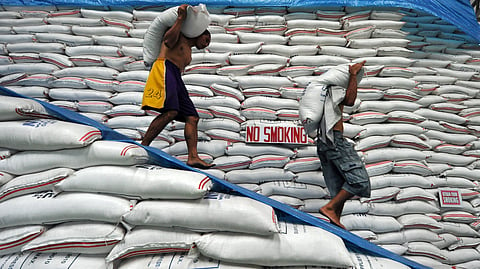
- NEWS
- the EDIT
- COMMENTARY
- BUSINESS
- LIFE
- SHOW
- ACTION
- GLOBAL GOALS
- SNAPS
- DYARYO TIRADA
- MORE

As a step in ensuring rice yield sustainability and that farmers utilize government funds, the Department of Agriculture ordered the review of the voucher system under the National Rice Program.
In a statement, they disclosed that the program is set for major changes in the coming months.
Under the program, vouchers will be rolled out to farmer beneficiaries that could be exchanged for farm inputs, including fertilizers and rice seeds, at DA-accredited merchants.
Agriculture Secretary Tiu Laurel Jr. said many merchants refuse to honor vouchers because they haven’t been paid, with total payables reaching P892 million, with some dating as far back as 2021.
“The bulk of the arrears amounting to P849M are payables from the recently concluded 2023-2024 Dry Season implementation. Payment delays are often due to incomplete documentary requirements,” DA said.
In partnership with the Development Bank of the Philippines, the DA said it is formulating new processes for settling accounts with accredited merchants. “Improved rice seeds and the right amount of fertilizer, along with sufficient irrigation, contribute significantly to raising rice yields,” the agency said,
Moreover, DA also issued Memorandum Order 8, Series of 2024 to provide clearer guidelines for the implementation of programs and projects as indicated in the Special Provisions under the 2024 General Appropriations Act.
According to Laurel, the current voucher system has not addressed certain issues at the level of priority sectors and end users.
The voucher system is a major channel for DA's distribution of the P22.9 billion budget this year allocated for farm inputs, including hybrid rice seeds, organic and inorganic fertilizers, and funds for the use of drone technology in rice cultivation.
“Nearly P10 billion in inputs and assistance will be delivered to farmers via the voucher system. Other modes allowed under the (GAA) this year include the use of intervention monitoring cards (IMC)—e-wallets used for distributing P5,000 assistance to farmers under the Rice Tariffication Law—and direct distribution of inputs that DA regional offices are authorized to procure from qualified suppliers.”
Laurel said changes to the voucher system “increase grain supply towards self-sufficiency levels, and consequently, increase farmers' income.”
“By doing this, we will not only increase farm output but optimize the use of post-harvest and milling facilities to reduce wastage. It will increase farm yield, boost financial returns for farmers, and substantially bolster supply that could eventually bring down food cost for consumers,” he said.
